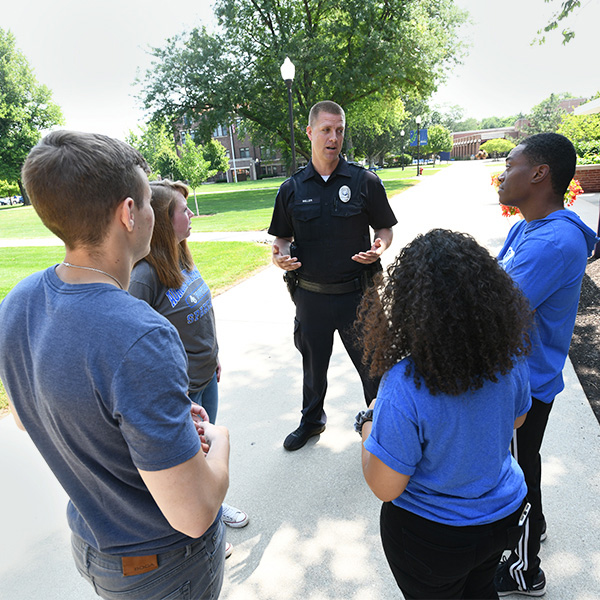Criminal Justice (MS)

Why earn your MS in Criminal Justice at Aurora University?
Through the Accelerated Advantage Master of Science in Criminal Justice program (formerly the MS in Criminal Justice Plus One program), you can take the next step in your career by earning your graduate degree in just one year. This full-time program is designed for students from diverse academic backgrounds, including business administration, computer science, cybersecurity, psychology, political science, and public policy. It's also ideal for professionals in the field who are looking to advance their expertise.
This immersive program is focused on three key areas: psychology, law, and leadership. You'll gain insight into cutting-edge topics and contemporary challenges within the criminal justice system and learn practical skills to address the complex issues facing criminal justice agencies today.
Aurora University's Accelerated Advantage MS in Criminal Justice is a full-time, one-year program that begins in June and finishes the following May. Classes are held during the day on the main AU campus.
- It will increase your earning potential. U.S. workers holding a master’s degree earn 19 percent more in average annual salary than those with a bachelor’s degree, according to the Bureau of Labor Statistics 2025.
- It’s a great value. AU graduate programs are affordable and have impressive student outcomes.
- Athletes can stay on the team. It’s a great option for student-athletes with a remaining year of athletic eligibility.
- It offers a streamlined application process. There is no application fee and no GMAT/GRE required to apply for the program.
- There are no textbook costs. You'll benefit from a tuition structure that includes textbook costs, professional organization membership fees, and high-impact experiences.
- Admission requirements are simple. All that’s required is:
- A completed graduate application for admission.
- A cumulative undergraduate GPA of 3.0 or higher.
A master’s degree in criminal justice can help a law enforcement officer get promoted, sharpen critical skills for someone in a criminal justice-related field, or serve as an entry point for a competitive job, such as a position at a federal agency.U.S. News and World Report, 2019
Experiential learning

You will gain hands-on experience by completing a graduate-level internship tailored to your career goals. Internships take place at federal, state, and local law enforcement agencies, private security firms, law offices, probation departments, and social service organizations. This allows you to apply your coursework in the field, build practical skills, and expand your professional network.
Sample Schedule
Accelerated Advantage students meet as a cohort during summer, fall, and spring semesters.
| Term | Classes |
|---|---|
| Summer: 9 semester hours June–August; 10-week courses Monday–Thursday, 8 a.m.–Noon |
|
| Fall: 12 semester hours August–December; 8-week courses Monday–Thursday, 9 a.m.–Noon |
|
| Spring: 9 semester hours January–May; 8-week courses Saturday, 9 a.m.–Noon |
|
|
January–May; 16-week course |
|
Career possibilities
- Emergency management official
- Federal marshal
- Forensic examiner
- Intelligence analyst
- Investigator
- Law enforcement officer
- Military officer
- Police officer
- Probation/parole officer
- Sheriff
- Special agent at a federal agency
Where our graduates work
AU alumni work in a variety of agencies that provide service to their communities and their country.
- Corrections and court services
- Emergency management
- Federal Bureau of Investigation
- Nonprofit agencies
- Private sector defense
- State and local police departments
- U.S. Department of Homeland Security
- U.S. Department of Justice
- U.S. military